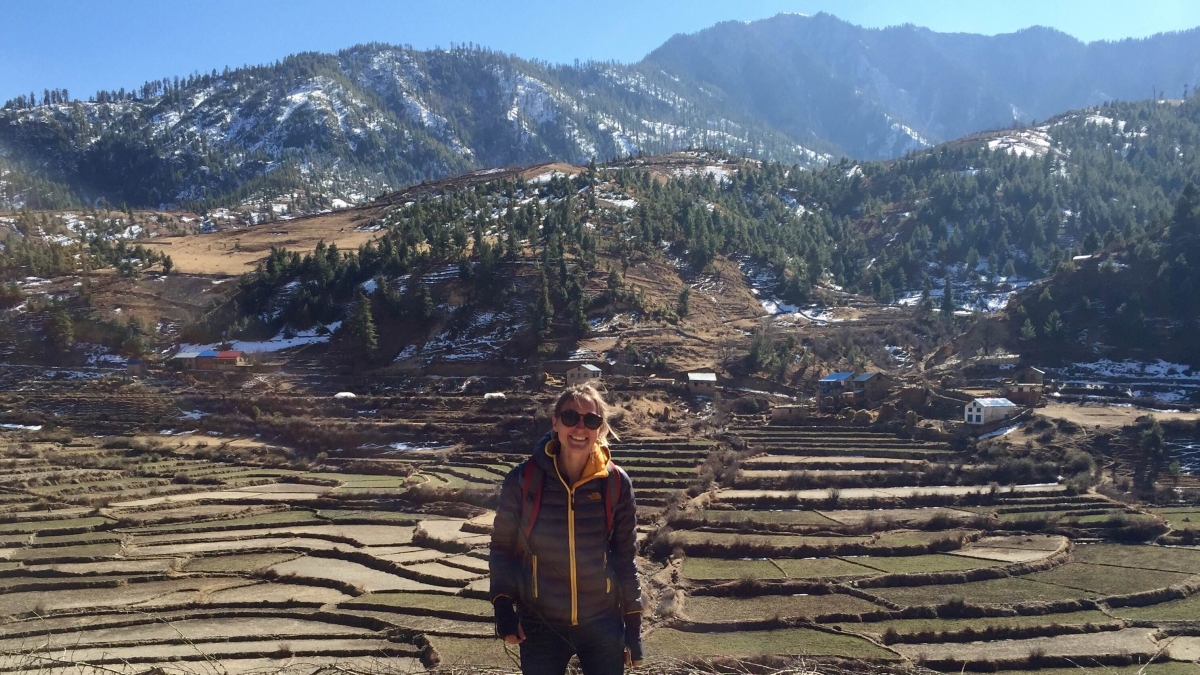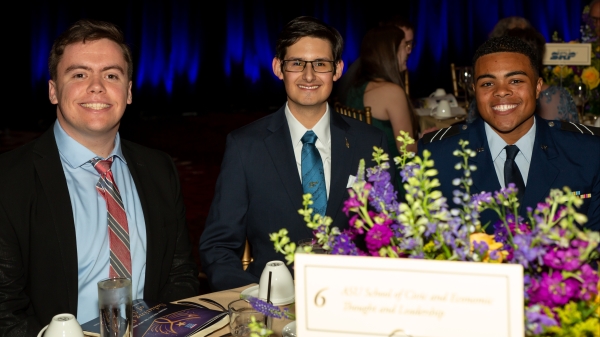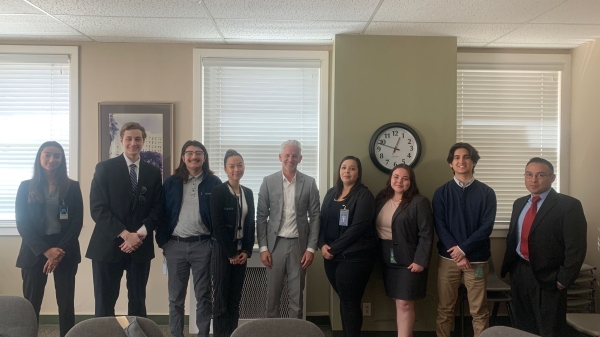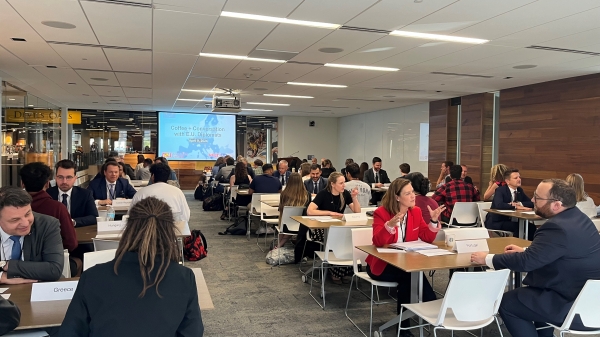Bringing relief to Nepal
ASU doctoral student Ashley Hagaman won a Fulbright to study suicide, health systems

Ashley Hagaman has lived through one of the most devastating disasters of the decade while doing research in Nepal.
Hagaman, who is pursuing a doctorate in global healthin the School of Human Evolution and Social Change, a unit within the College of Liberal Arts and Sciences at Arizona State University, won a Fulbright grant to study suicide and health systems.
Three months after her research started, in April 2015, an earthquake hit Nepal, killing more than 8,000 people and injuring 21,000. Hundreds of thousands of people were left homeless and strong aftershocks continued for weeks.
“Our work halted as my colleagues feared for their families and their future,” said Hagaman, who is from Michigan.
“I was awestruck when my co-workers, many of which lost their homes and loved ones, immediately began providing emergency psychosocial services to those living in the worst hit areas.
“It was hard. It was scary. But we were all in it together, and that was incredible.”
Suicide is not studied in Nepal, and the nature of Hagaman’s work is challenging.
“It's always emotional,” she said. “But it’s also beautiful to link families to services, to see communities initiate support groups and to collect information that we can use to design a program that can help prevent future suicides.
“It's tough, but our team makes it hopeful.”
Hagaman answered some questions about her Fulbright project.
Question: Can you give an overview of what you’re doing in Nepal?
Answer: In Nepal, suicide is speculated to be the leading cause of death amongst women of reproductive age. Despite its massive burden, health and development organizations have no prevention programs in place, and the government doesn't collect any suicide-related data.
I study how the health priorities are skewed, often reflecting the interests of multi-lateral agencies, world powers and government ministers instead of the needs of local people. I study how the health system neglects a leading cause of death. I study how suicide is experienced, perceived and dealt with at both the local and global level.
To do this, I work in both Kathmandu (the country's capital) and a rural western Himalayan district called Jumla. I spend time with families who have lost someone to suicide, what the drivers were, and I track how that death never gets identified by the health system.
Finally, I work alongside a local mental health non-governmental agency to develop the first suicide prevention program that we can implement in future work.
Q: What is a typical day like for you?
A: If I'm in my rural field site, we'll likely be trekking to find a family that lost someone to suicide. We usually have to walk two to three hours and will take their interview for two hours or so. There's usually a lot of tea consumed, baby goats held and difficult conversations had.
In Kathmandu, I'm either spending the day with a police officer (the only officials who investigate and document suicide cases), doctors (treating attempted suicides in the large government hospital), or government officials (making decisions about what health issues to prioritize and which ones won't receive any funding). My day always ends with “dal bhaat” with my family — the traditional Nepali meal including rice and lentils.
Q: What do you do on the weekends?
A: We hike as much as we can! Nepal is a gorgeous country with so much to do outside. We'll do small day hikes in the mountains surrounding the Kathmandu valley, or take a weekend trip to a rural district with great trekking routes. I also run with a local running club to learn new towns
Q: What’s been the best part of your experience?
A: Nepal is one of the most beautiful places in the world. I get to live and work under the Himalayas, hike in carefully terraced land and develop relationships with incredible people and communities. I love that I learn something new every day. Even if all I have to do is laundry, something exciting will happen. I love that I now have Nepali brothers and sisters, aunts and uncles who will laugh at my awful Nepali and make the most delicious tea. I also get to work with an incredible team of brilliant researchers that believe, together, we can make a mental health a priority in a country where there is tremendous need.
Q: Has anything funny happened during your adventure?
A: Every single day. Living in a country where the language, culture and everyday activities are not your own, you're constantly messing up — and the best way to deal with it is to laugh it off.
I have no shortage of funny stories of me making a fool of myself. But one of my favorites is when I was in the southern part of the country, which has jungles with rhinos, tigers and elephants. I was on an evening walk with friends and we came upon a giant suspension bridge leading into a jungle. We happily went exploring, joking about encountering a wild rhino. AND THEN WE DID.
That’s also when we figured out that we took a bridge to an isolated island and the only way to get home was to follow the rhino. We heard that if you run in zig zags, rhinos can't easily follow you. So we ran through the brush, curving in as many zig zags as possible, laughing at how ridiculous this was.
We made it home safe, and proud that we successfully got into, and out of, a precarious encounter with a very large animal.
Q: What will you bring back from your experience that will help you in your career — or your life?
A: My research funded by Fulbright will be the platform for the development of suicide-prevention programs I hope to implement as a professor. Currently there are no public health programs.
I'll continue to learn alongside my fellow Fulbrighters and I'm eager to see many of them back in Nepal soon.
Q: What’s next for you, after you return?
A: I'll write my dissertation and hope to graduate by spring 2017. I want to be a professor in a school of public health. I'm excited to create classes about global mental health and innovative field research methods. I'll continue my research in Nepal and other low-income settings, shifting my focus to testing public health interventions to reduce suicidal behavior.
More Local, national and global affairs

ASU class connects students with veterans
A brand-new class offered this spring through Arizona State University's School of Civic and Economic Thought and Leadership is making an impact on students and military veterans. The course,…

ASU Sacramento Scholars learn about government through hands-on experience
Brian Lizarraga of Sacramento, California, is in his first year as an undergraduate at Arizona State University. Being an out-of-state student, he didn’t have to leave his hometown, the state…

EU delegation visits ASU with an eye toward collaboration on semiconductors
Arizona State University has attracted nationwide attention for its innovation related to the CHIPS and Science Act of 2022. Now the world at large is taking notice. On April 9, approximately two…